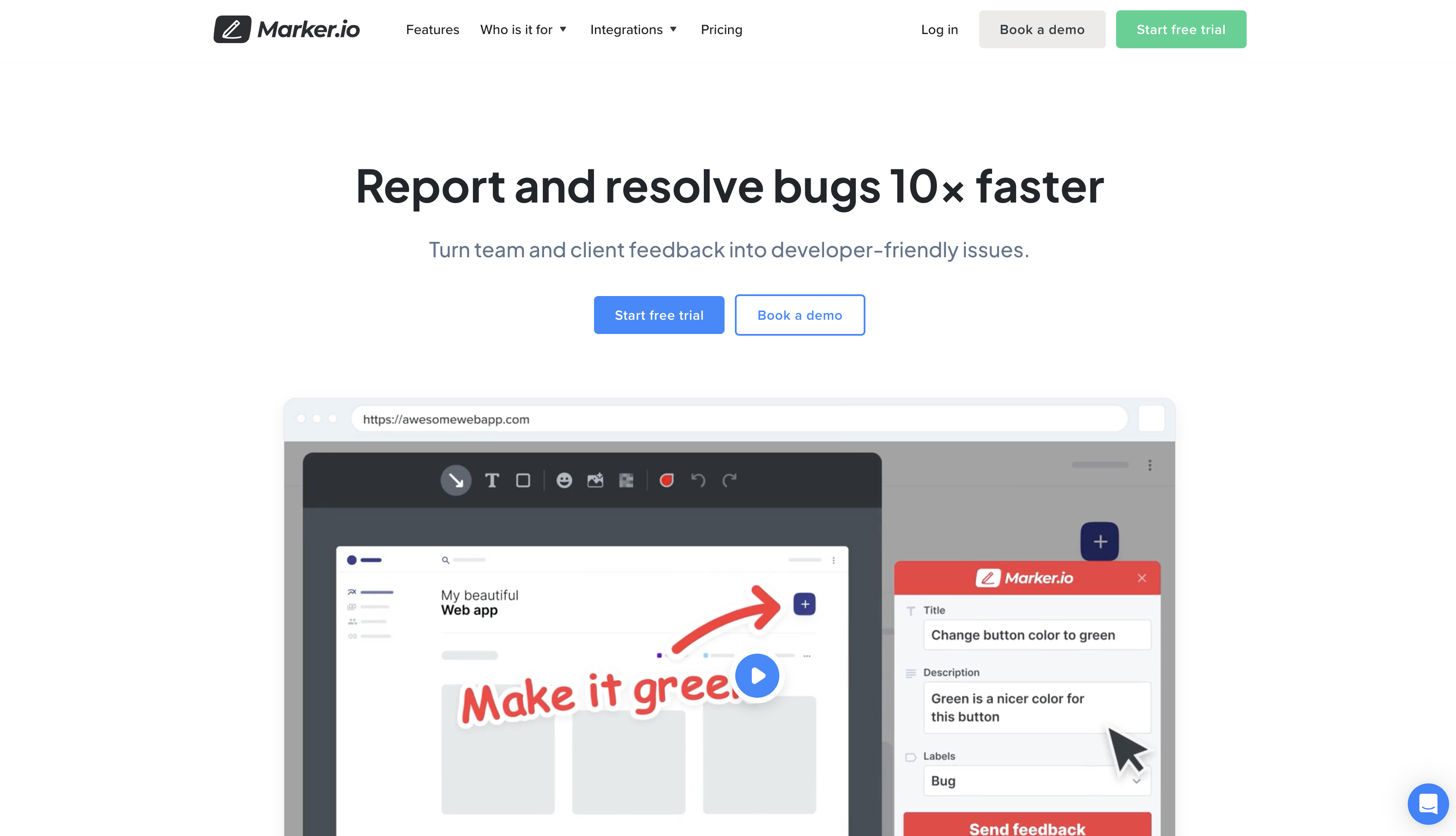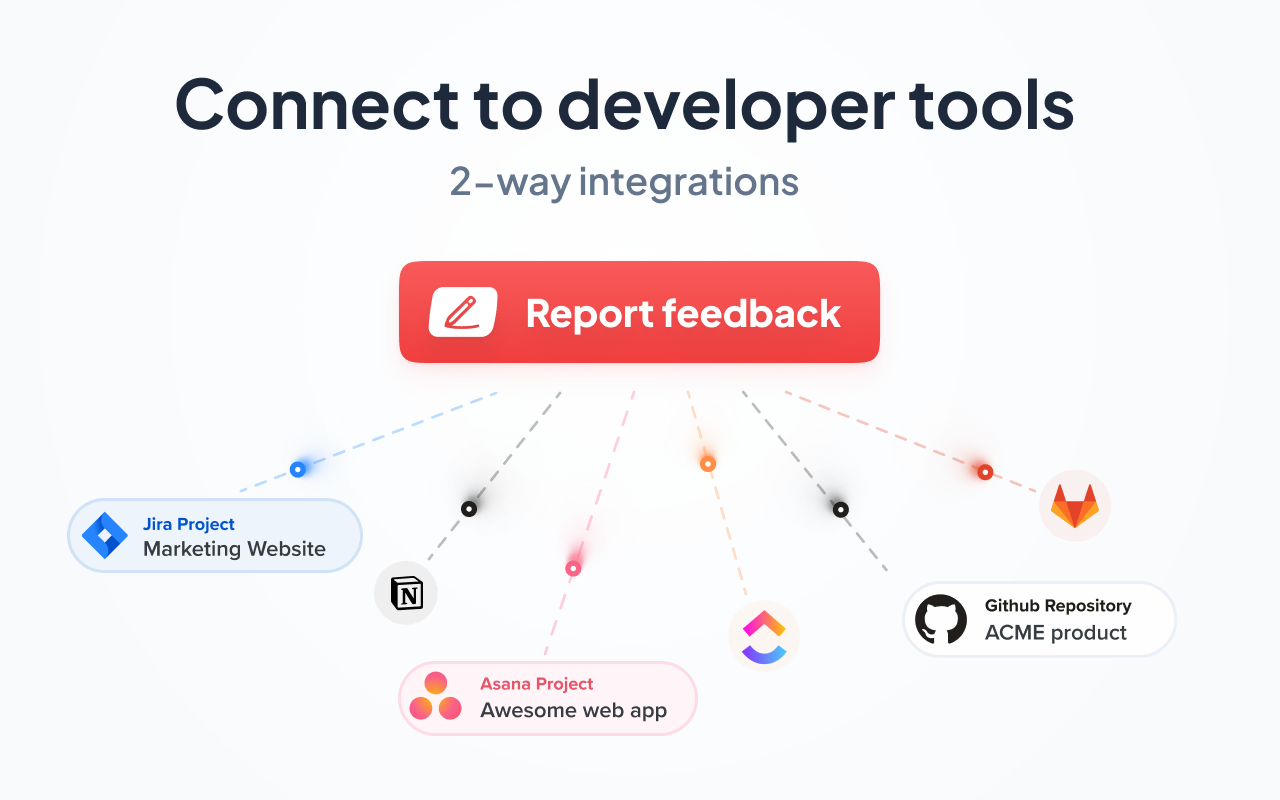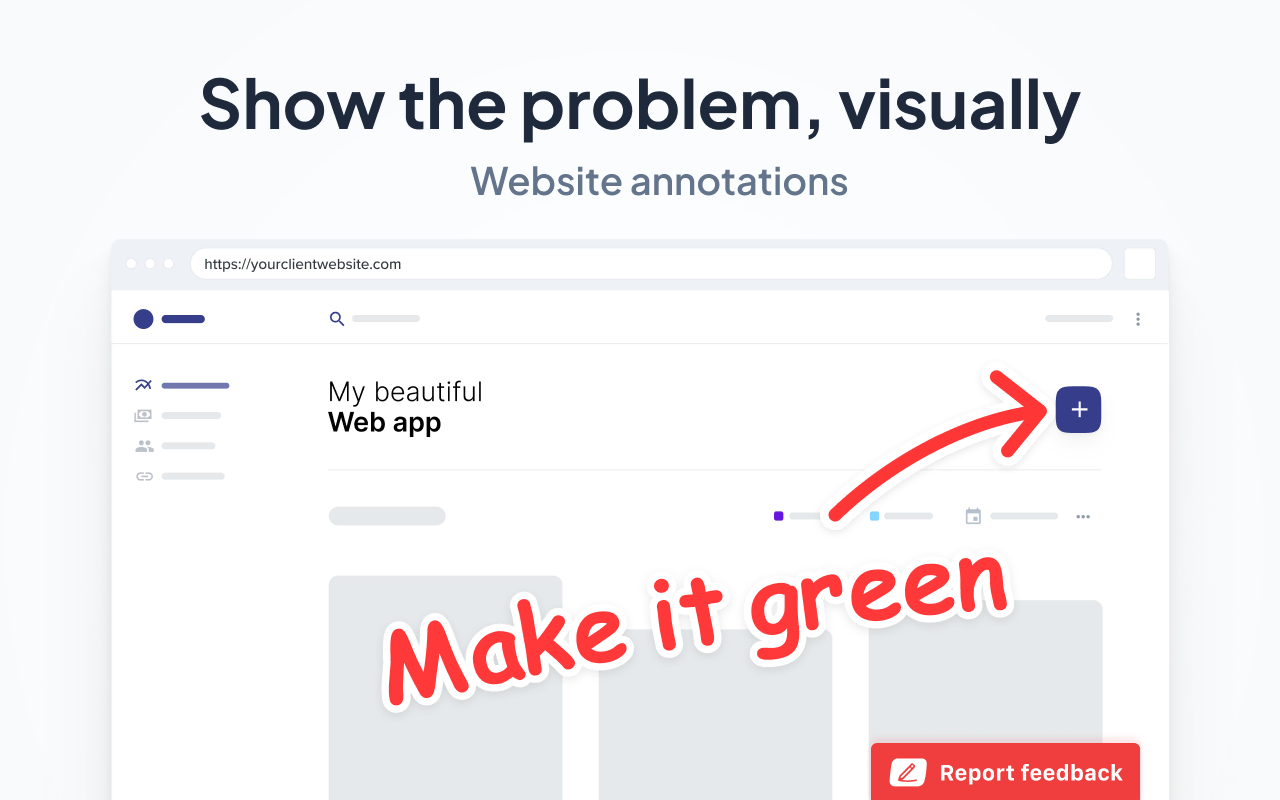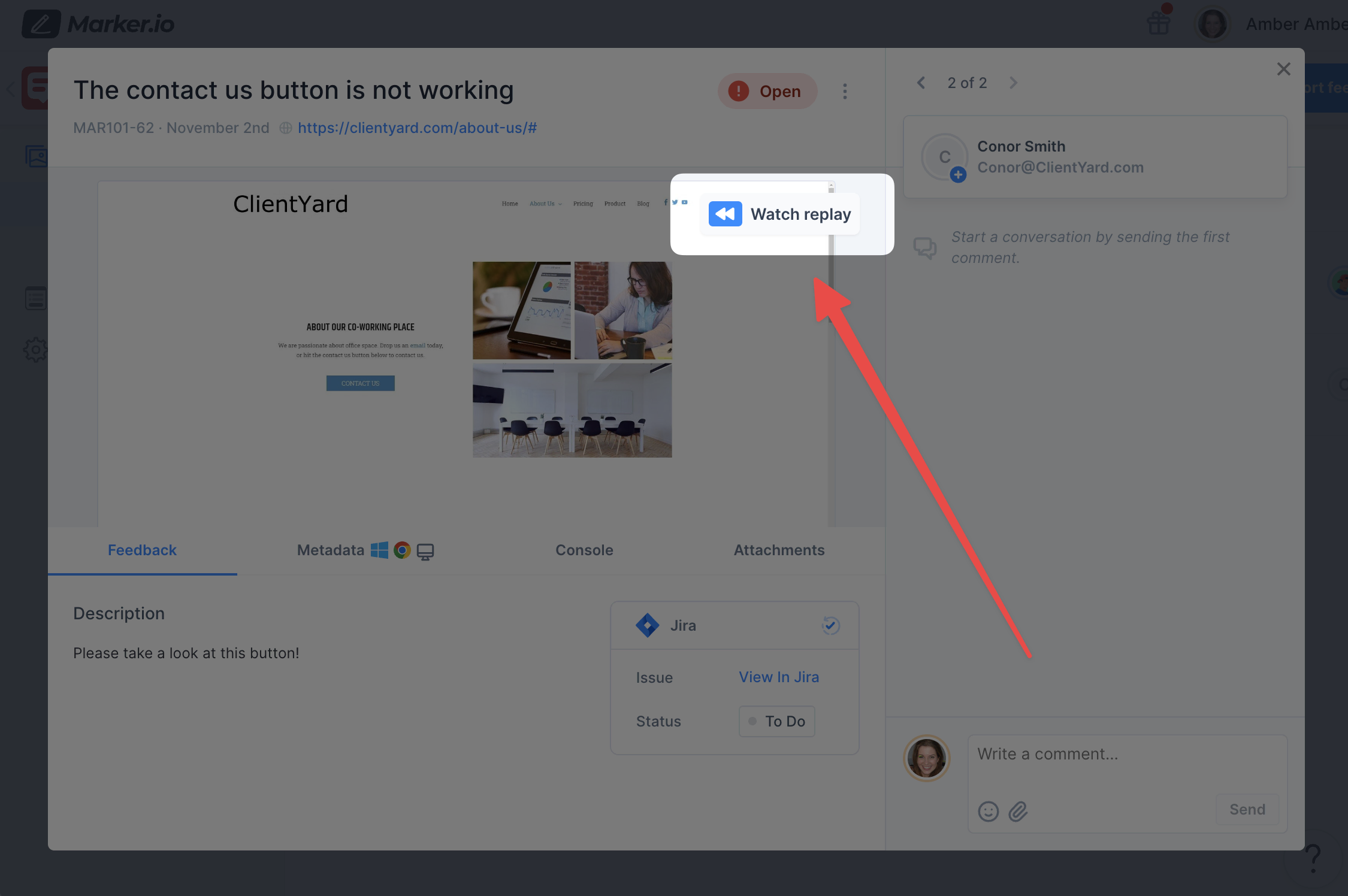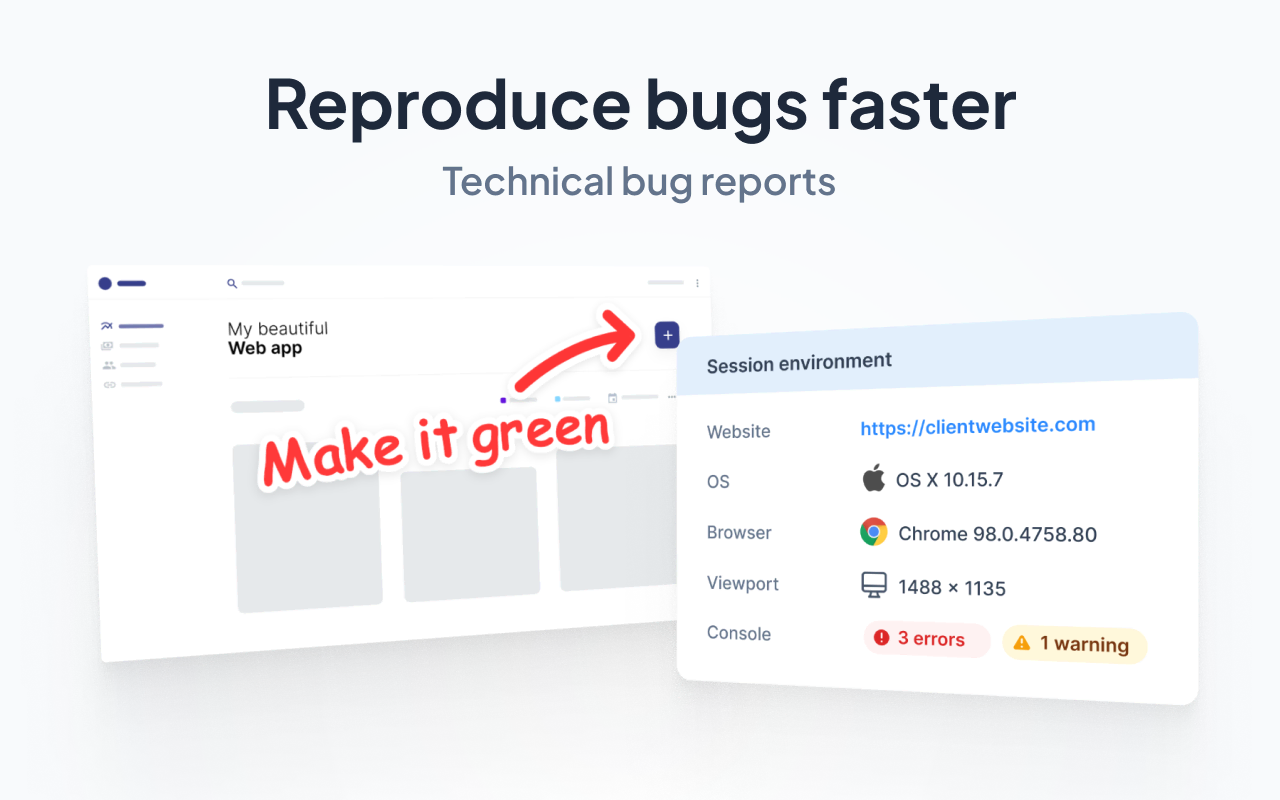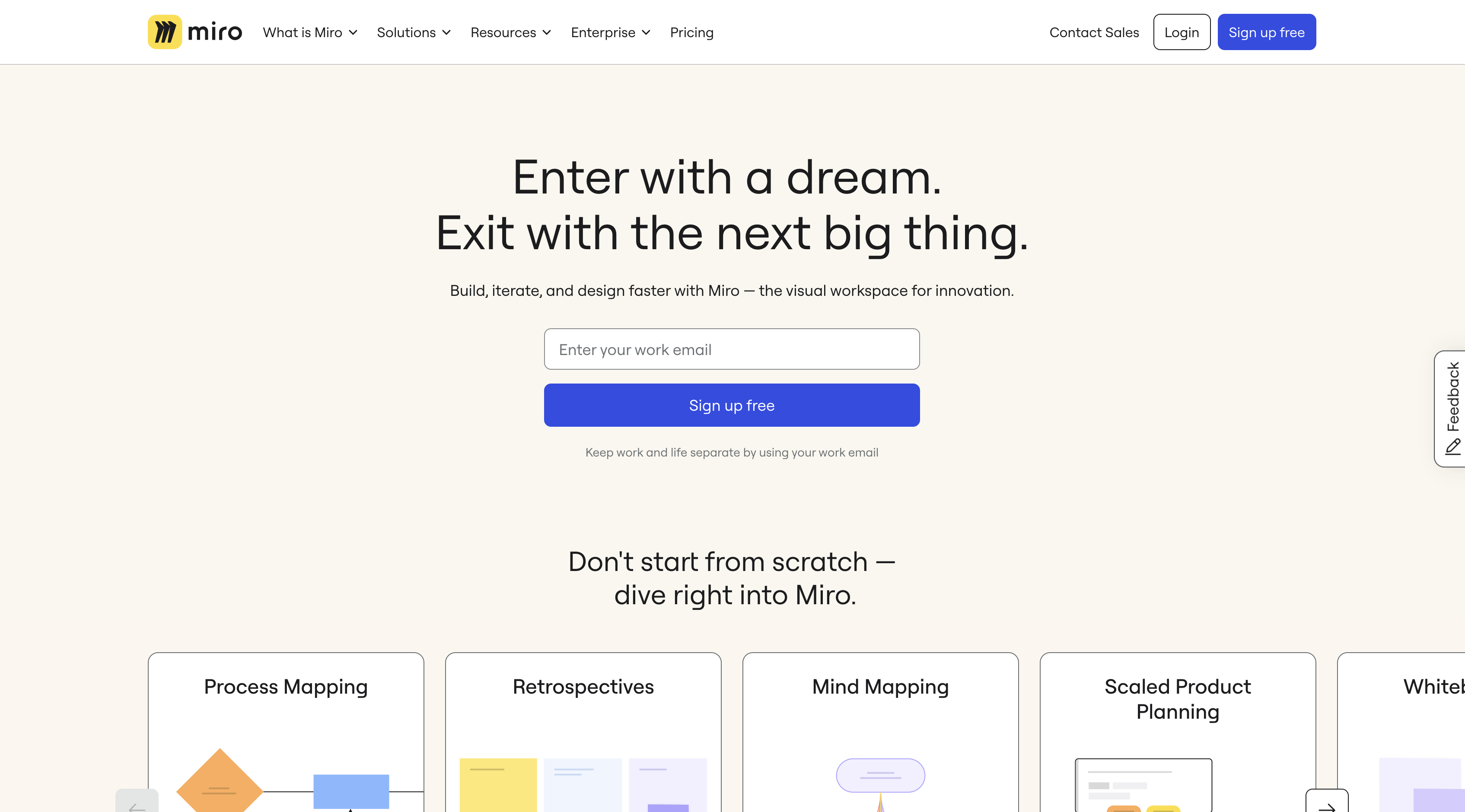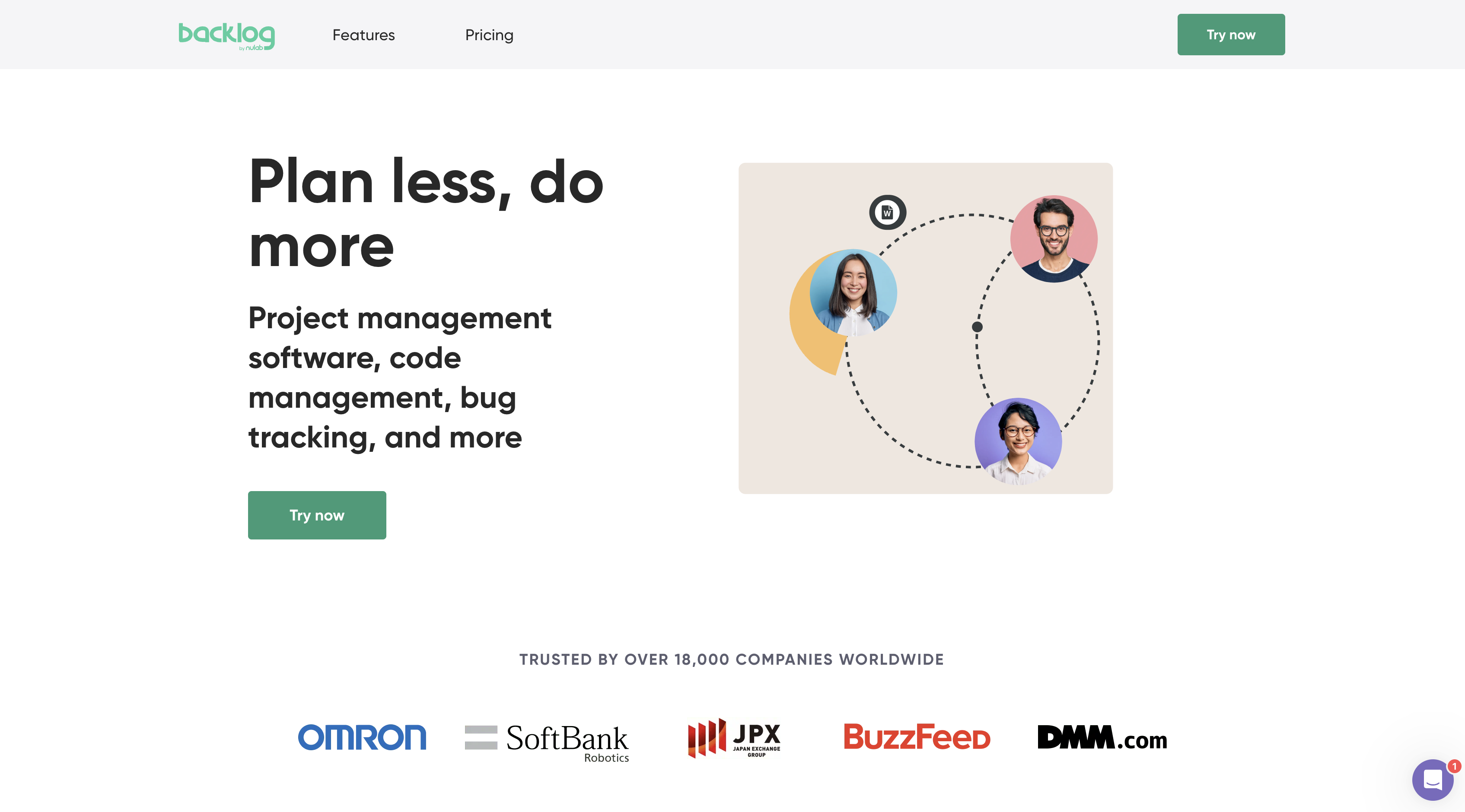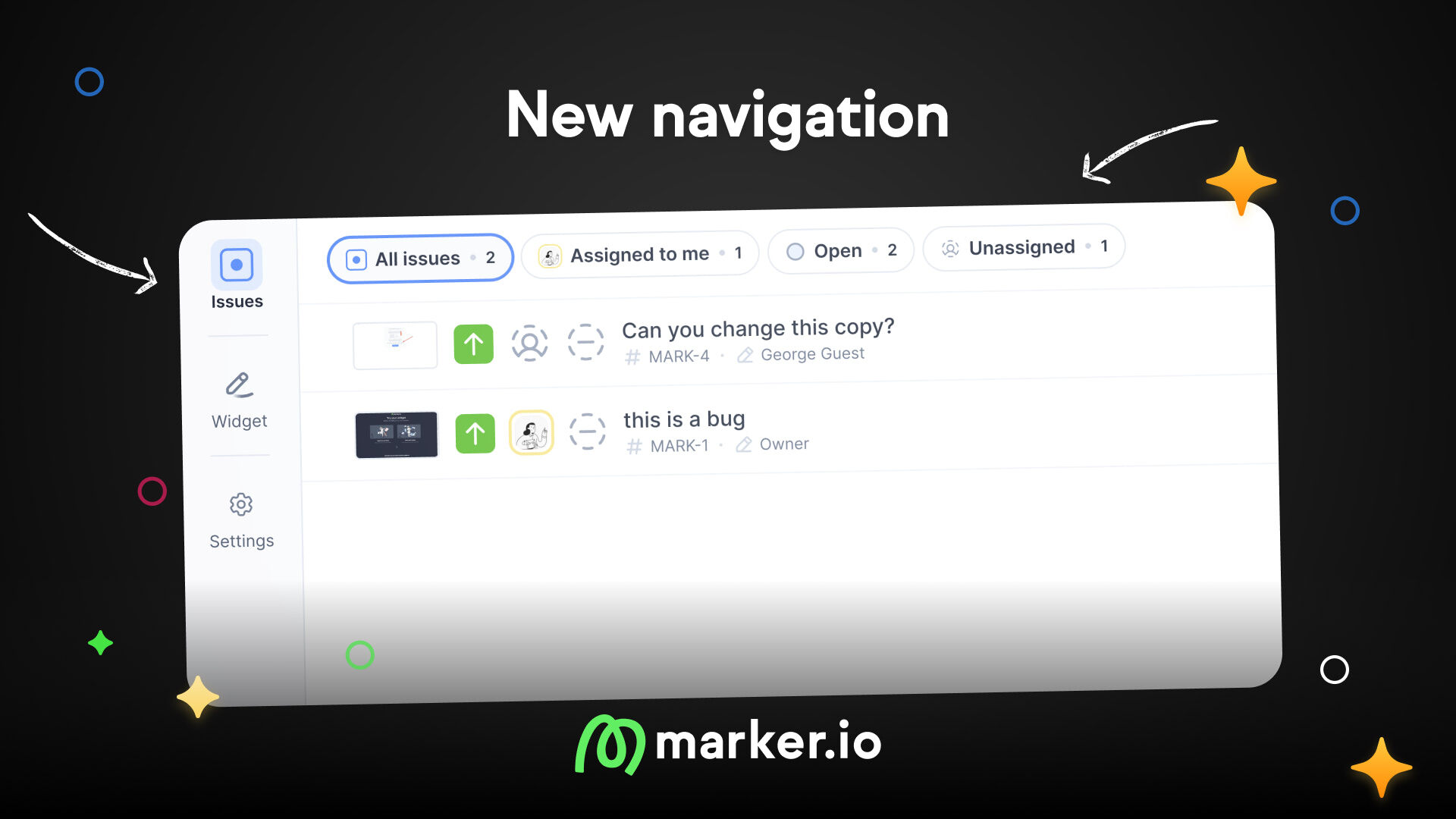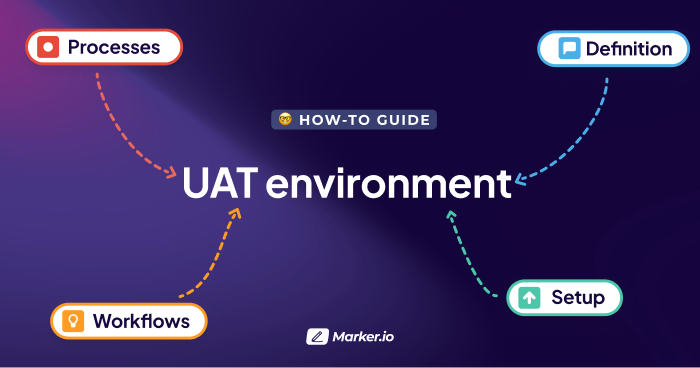9 Best Markup.io Alternatives in 2024: Which One is Right For You?
In this blog post, we're comparing the top 9 alternatives to Markup.io for gathering feedback during website development projects.
In this blog post, we're comparing the top 9 alternatives to Markup.io for website development feedback.
Gathering feedback from clients can be challenging.
Managing multiple website projects requires an efficient and straightforward tool.
Markup.io is one such tool, but it might not be the best fit for everyone.
In this article, we'll compare Markup.io with eight other tools.
This comparison will help you decide which tool is the best fit for your agency, team, and client projects.
What is Markup.io?
Markup.io is a website feedback and approval tool—used to gather client feedback before a site goes live.
It includes a Chrome extension for in-browser testing.
However, Markup.io does not integrate with project management tools.
That means any feedback recorded in Markup.io must be transferred to your project management solution for action.Pricing starts with a free version (5 markups), with a monthly subscription from $29/mo (unlimited markups), a 30-day free trial, and a custom-price enterprise option.
Let's see how Markup.io stacks up against other website feedback and markup tools!
9 Best Markup.io Alternatives and Competitors
Let's compare Markup.io with 9 other alternatives.
1. Marker.io
Feedback and bug reports from live or staging websites go directly into your project management tools, saving time.
Marker.io is a user-friendly tool for website feedback, markup, and bug reporting. It's designed for agency owners and project or product managers.
With Marker.io, you can:
- Automatically sync every bug report with your project management tool. Feedback becomes actionable tasks, and clients are notified upon completion.
- Collect visual feedback, including screenshots and annotations, from clients, colleagues, and other stakeholders.
- Assign feedback to web designers or developers and notify reporters via the 2-way project management sync.
- Collect data-rich bug reports including automatic environment and console logs capture. All necessary data for bug replication and resolution goes straight into your project management tool.
- Use our session replay tool to see user actions before a report was sent. This tool saves significant time and makes Marker.io a preferred choice for many agencies.
- Find, reproduce, and fix bugs faster with our network request recorder tool. Access reporters' logs as if you were using their browser dev tools.
2-way sync and integrations with PM tools
Unlike most website feedback tools, Marker.io is the only one to offer 2-way sync with PM software.
Typically, feedback loops work like this: a product manager or agency owner sends a client a link to a new website or app via a staging site.
Then, an iterative feedback process starts, often involving several cycles as different people contribute.
Clients give feedback via email, Slack, Google Meets, or Zoom calls.
It can take days or weeks to get the feedback you need.
After collecting everyone's input, you need to spend a few hours transferring every email, Slack message, and note into your project management tool.
With Marker.io’s automatic 2-way project management sync, all that is a thing of the past.
Website design feedback and bug reports go straight into your project management tool.
And because of our two-way sync, when an issue is marked as “Done” in your project management tool, that task is marked as “Resolved” in Marker.io.
Automatic notifications can be sent via email to the client, speeding up the sign-off process.
Here’s Marker.io's 2-way sync in action:
Visual annotations
Marker.io works as a small feedback button on any website, app, or SaaS product you upload it to.
Whether it comes to internal or external feedback, all anyone needs to do is:
- Click the button when they’ve found a bug.
- Fill out the feedback form and input details.
- Click on “Report Feedback”—done!
Every bug report or piece of feedback reported via Marker.io goes directly into your PM tool (e.g., Jira, Trello, Linear…).
Check it out:
Session replay
Record user sessions with session replay.
Reproducing a bug can be challenging, even with detailed reports and our network request recorder.
It’s easier if you can see exactly what happened when a user or client encountered a bug.
Well—Marker.io's toolset includes session replay to solve that problem.
Each bug report or piece of feedback includes a “Watch replay” video.
You can then watch the last 30 seconds (or more) before the report was submitted.
Here’s Marker.io's session replay in action:
Data-rich bug reports
Clients and users often don't know what information you need to fix bugs.
Bugs are a common occurrence for websites, apps, and SaaS products.
However, vague bug reports like "Oh no, something’s broken; here’s what happened; please fix it" are not helpful.Engineers need detailed information, such as:
- The URL the reporter was on
- Environment and console logs
- Metadata (browser, device, OS, etc.)
- Session replay/recording and other useful data
Marker.io automatically collects all necessary data, including visuals and video recordings, and includes it in your PM tool.
Save time on bug tracking and client feedback. Try Marker.io for free today.
Pricing starts at $39/mo.
2. Miro
A collaborative visual platform for iterative feedback loops and markups.
Miro is a collaborative whiteboard and markup tool for website feedback and design ideation.
Best for: Collaboratively creating design concepts to finalize designs before development begins.
Key features:
- Create collaborative visual markup whiteboards for real-time collaboration, including with live websites
- Develop user journey maps and conduct remote design and UX workshops
- Integrate it with other tools, such as UX research software and bug-tracking
Pros: Great for teams working with designers, offering powerful features at a cost-effective price.
Cons: A resource-intensive app, which can be challenging for designers using other demanding tools. Support is also limited.
Alternatives: Figma.
Pricing: From $10/mo.
3. Backlog
Collaborative project management, markup, and issue-tracking tool for website development teams and agencies.
Backlog allows you to focus on bug tracking and managing code repositories throughout the development lifecycle.
Best for: Web developers, UI/UX designers, QA engineers, agencies, and their clients to quickly secure issue reports and feedback during the pre-staging phase.
Key features:
- Project progress assessment
- Agile PM features with boards, Gnatt, burndown charts, and sprints
- Bug and issue tracking
Pros: Great PM software and issue tracking for virtual teams.
Cons: Additional features would be useful, especially for larger teams.
Alternatives: Marker.io.
Pricing: From $35/mo, for up to 30 users.
4. Figma
Create and give feedback on interactive prototypes on one platform.
Figma is a popular design markup and feedback tool for web designers.
Best for: Figma is best for creating mockups and prototypes, and gathering feedback during the design phase.
It’s ideal for devs and designers needing real-time collaboration and feedback to advance projects quickly.
Key features:
- An easy-to-use interface for collaboration
- Dozens of plugins and apps
- FigJam, an online whiteboard, and more
Pros: Designs and prototypes feel more real for clients who want to see how something will look quickly.
Cons: Not beginner-friendly and the shortcuts aren’t easy to master.
Pricing: From $12/mo per user, or only $3/mo per user for FigJam.
5. Asana
PM suite with AI-powered automation workflows.
Asana excels at organizing tasks, team collaboration, checklists, feedback, and meeting project deadlines.
Best for: Project and product managers, agency owners, and in-house dev team leaders who need to manage design and build projects from start to finish, while also utilizing client feedback tools.
Key features:
- Create custom fields for tailored project management
- Set up time-tracking, due dates, and team workload management
- Use advanced search and reporting with data export
Pros: Lots of powerful PM suite features and tools.
Cons: On the expensive side for larger teams and customer support isn’t very helpful.
Alternatives: Jira and ClickUp.
Pricing: From $13.49/mo per user.
Want to collect bug reports and feedback directly into Asana? See how our Asana/Marker.io integration works.
6. Jira
Project management suite with advanced workflows.
Jira is a powerful issue-tracking and project-management tool used by software development teams.
Best for: Agency owners and product managers who need to oversee every project in one tool, managing every aspect of each build and development project.
Key features:
- A robust issue tracking and ticketing system
- Agile project management capabilities
- Integration with various development and collaboration tools via the Atlassian Marketplace
Pros: Lots of powerful features especially when combined with other Atlassian products.
Cons: Not very beginner-friendly, and there are apps with a better UX for smaller teams.
Alternatives: ClickUp and Asana.
Pricing: From $7.75 per user/monthly (for 10+ teams; it’s free for smaller teams).
Want bug reports to go straight into your PM suite? Learn how to integrate Jira with Marker.io here.
7. ClickUp
Versatile platform that combines project management, tasks, dashboards, docs, chat, collaboration, and feedback functionality.
ClickUp offers a comprehensive suite of features in a single tool.
Best for: Managing website design and development projects from start to finish.
Can be used by teams across all business functions, including customer service and finance.
Key features:
- Customizable task management with various views (list, board, Gantt chart, etc.)
- Easy-to-use documentation, whiteboards, templates, plugins, and dashboards
- And loads more than we can list, including AI-based tools and integrations
Pros: Lots of templates, plugins, dashboards, integrations, and learning modules.
Cons: Can be a steep learning curve for those who’ve not used it before.
Alternatives: Notion and Asana.
Pricing: From $9/mo (per user). Find out how you can easily integrate ClickUp with Marker.io here.
8. Aha!
Product development suite with similar features to PM tools.
Aha! is a product development and roadmap software suite with dozens of useful features.
Best for: Busy product managers and agency owners who need to roadmap product development and implement actionable plans with team members and clients.
Key features:
- Collect product roadmap ideas in the Roadmaps tool
- Capture customer ideas for features in the Aha! Ideas tool
- Map out roadmaps on the Whiteboard and manage the development in the Develop PM suite
Pros: Lots of features, as you’d expect in PM software.
Cons: Lacking when it comes to the UI/UX for customers who are used to more developed products on this list.
Alternatives: ClickUp and Jira.
Pricing: From $74/mo per user.
9. Canva
Web design tool with collaborative features.
Canva makes the design process easier for designers and non-designers alike. It is perfect for creating all kinds of visual assets in a pinch.
Best for: User-friendly graphic design, social media content creation, and online collaboration between clients and agencies or freelancers.
Key features:
- User-friendly, drag-and-drop interface
- Collaborative features for real-time teamwork
- Extensive library of free and paid stock photos, illustrations, and icons
Pros: Extremely easy to use, with a shallow learning curve and ready-made templates. Free plan available.
Cons: Limited design flexibility compared to more advanced design tools. Not suitable for advanced, complex projects.
Alternatives: Figma and PicMonkey.
Pricing: Free plan, and a $12.99/mo Pro or $14.99/mo per user Team plan.
Wrapping up...
And there we have it—a list of the best 9 Markup.io alternatives and competitors.
These tools empower users to provide feedback and report bugs. Plus, they automatically alert clients when a problem gets fixed.
We trust this list will guide you in selecting a suitable Markup.io alternative.
Did we miss anything? Let us know on Twitter (now X) or via email!
What should I do now?
Here are three ways you can continue your journey towards delivering bug-free websites:
Check out Marker.io and its features in action.
Read Next-Gen QA: How Companies Can Save Up To $125,000 A Year by adopting better bug reporting and resolution practices (no e-mail required).
Follow us on LinkedIn, YouTube, and X (Twitter) for bite-sized insights on all things QA testing, software development, bug resolution, and more.
Frequently Asked Questions
What is Marker.io?
Who is Marker.io for?
Marker.io is for teams responsible for shipping and maintaining websites who need a simple way to collect visual feedback and turn it into actionable tasks.
It’s used by:
- Organizations managing complex or multi-site websites
- Agencies collaborating with clients
- Product, web, and QA teams inside companies
Whether you’re building, testing, or running a live site, Marker.io helps teams collect feedback without slowing people down or breaking existing workflows.
How easy is it to set up?
Embed a few lines of code on your website and start collecting client feedback with screenshots, annotations & advanced technical meta-data! We also have a no-code WordPress plugin and a browser extension.
Will Marker.io slow down my website?
No, it won't.
The Marker.io script is engineered to run entirely in the background and should never cause your site to perform slowly.
Do clients need an account to send feedback?
No, anyone can submit feedback and send comments without an account.
How much does it cost?
Plans start as low as $39 per month. Each plan comes with a 15-day free trial. For more information, check out the pricing page.
Get started now
Free 15-day trial • No credit card required • Cancel anytime



